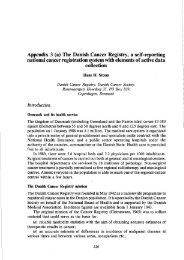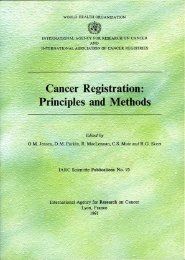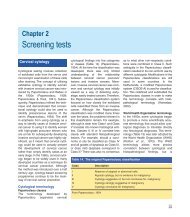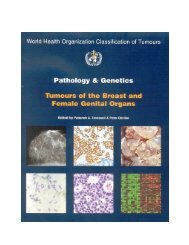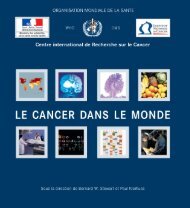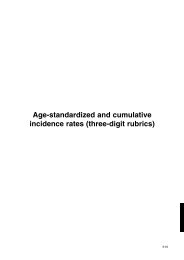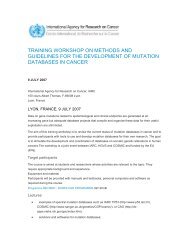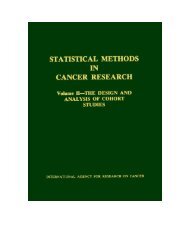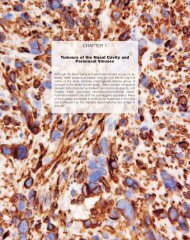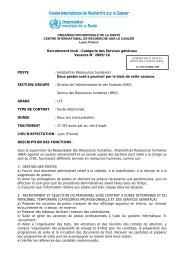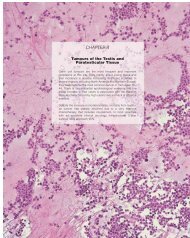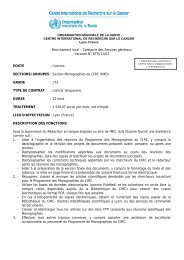world cancer report - iarc
world cancer report - iarc
world cancer report - iarc
Create successful ePaper yourself
Turn your PDF publications into a flip-book with our unique Google optimized e-Paper software.
applies to depressed, flat neoplastic<br />
lesions (type IIc) only when the diameter<br />
does not exceed 1 cm.<br />
Sporadic advanced colonic <strong>cancer</strong> is<br />
treated by segmental colectomy with a<br />
tendency to large resection. Adjuvant<br />
chemotherapy (5 FU-levamisole or 5 FUleucovorine)<br />
is recommended if lymph<br />
node invasion is confirmed and some<br />
advocate a similar indication in B2 (subserosal)<br />
tumours. Recently introduced<br />
cytotoxic drugs, such as irinotecan and<br />
REFERENCES<br />
1. Troisi RJ, Freedman AN, Devesa SS (1999) Incidence of<br />
colorectal carcinoma in the U.S.: an update of trends by<br />
gender, race, age, subsite, and stage, 1975-1994. Cancer,<br />
85: 1670-1676.<br />
2. Tomatis L, Aitio A, Day NE, Heseltine E, Kaldor J, Miller<br />
AB, Parkin DM, Riboli E, eds (1990) Cancer: Causes,<br />
Occurrence and Control (IARC Scientific Publications, No.<br />
100), Lyon, IARCPress.<br />
3. Honda T, Kai I, Ohi G (1999) Fat and dietary fiber intake<br />
and colon <strong>cancer</strong> mortality: a chronological comparison<br />
between Japan and the United States. Nutr Cancer, 33: 95-<br />
99.<br />
4. Cohen AM, Minsky BD, Schilsky RL (1997) Cancers of<br />
the Colon. In: DeVita VTJ, Hellman,S, Rosenberg,SA eds,<br />
Cancer: Principles and Practice of Oncology, Philadelphia-<br />
New York, Lippincott-Raven, 1144-1197.<br />
5. Clapper ML, Chang WC, Meropol NJ (2001)<br />
Chemoprevention of colorectal <strong>cancer</strong>. Curr Opin Oncol,<br />
13: 307-313.<br />
6. Hamilton SR and Aaltonen LA, eds (2000) World Health<br />
Organization Classification of Tumours. Pathology and<br />
Genetics of Tumours of the Digestive System, Lyon,<br />
IARCPress.<br />
7. Ilyas M, Straub J, Tomlinson IP, Bodmer WF (1999)<br />
Genetic pathways in colorectal and other <strong>cancer</strong>s. Eur J<br />
Cancer, 35: 335-351.<br />
8. Gryfe R, Swallow C, Bapat B, Redston M, Gallinger S,<br />
Couture J (1997) Molecular biology of colorectal <strong>cancer</strong>.<br />
Curr Probl Cancer, 21: 233-300.<br />
202 Human <strong>cancer</strong>s by organ site<br />
oxaliplatin, are beginning to become<br />
established in treatment regimes [15].<br />
Advanced <strong>cancer</strong> located in the rectum is<br />
treated by neo-adjuvant radiotherapy if<br />
the tumour is either T3 (showing local<br />
invasion) or N+ (positive lymph nodes).<br />
Colorectal <strong>cancer</strong> is nowadays considered<br />
to be a chemosensitive tumour; in some<br />
patients, the occurrence of liver or pulmonary<br />
metastases does not exclude a<br />
curative management based upon combined<br />
resection and chemotherapy. The<br />
9. Potter JD (1999) Colorectal <strong>cancer</strong>: molecules and<br />
populations. J Natl Cancer Inst, 91: 916-932.<br />
10. Fujiwara T, Stolker JM, Watanabe T, Rashid A, Longo P,<br />
Eshleman JR, Booker S, Lynch HT, Jass JR, Green JS, Kim H,<br />
Jen J, Vogelstein B, Hamilton SR (1998) Accumulated clonal<br />
genetic alterations in familial and sporadic colorectal<br />
carcinomas with widespread instability in microsatellite<br />
sequences. Am J Pathol, 153: 1063-1078.<br />
11. Boland CR, Thibodeau SN, Hamilton SR, Sidransky D,<br />
Eshleman JR, Burt RW, Meltzer SJ, Rodriguez-Bigas MA,<br />
Fodde R, Ranzani GN, Srivastava S (1998) A National<br />
Cancer Institute Workshop on Microsatellite Instability for<br />
<strong>cancer</strong> detection and familial predisposition: development<br />
of international criteria for the determination of microsatellite<br />
instability in colorectal <strong>cancer</strong>. Cancer Res, 58: 5248-<br />
5257.<br />
12. Gryfe R, Kim H, Hsieh ET, Aronson MD, Holowaty EJ,<br />
Bull SB, Redston M, Gallinger S (2000) Tumor microsatellite<br />
instability and clinical outcome in young patients with colorectal<br />
<strong>cancer</strong>. N Engl J Med, 342: 69-77.<br />
13. McLeod HL, Murray GI (1999) Tumour markers of<br />
prognosis in colorectal <strong>cancer</strong>. Br J Cancer, 79: 191-203.<br />
14. Hegde P, Qi R, Gaspard R, Abernathy K, Dharap S,<br />
Earle-Hughes J, Gay C, Nwokekeh NU, Chen T, Saeed AI,<br />
Sharov V, Lee NH, Yeatman TJ, Quackenbush J (2001)<br />
Identification of tumor markers in models of human colorectal<br />
<strong>cancer</strong> using a 19,200-element complementary<br />
DNA microarray. Cancer Res, 61: 7792-7797.<br />
15. Grothey A, Schmoll HJ (2001) New chemotherapy<br />
approaches in colorectal <strong>cancer</strong>. Curr Opin Oncol, 13: 275-286.<br />
aggressive management of operable<br />
patients is based on initial segmental liver<br />
or lung resection followed by first line<br />
chemotherapy. In inoperable patients,<br />
first and second line chemotherapy protocols<br />
are proposed and a delayed surgical<br />
resection may be considered in some<br />
cases. The five-year survival following<br />
detection and treatment of colorectal <strong>cancer</strong><br />
is around 50% (Fig. 5.36).<br />
WEBSITES<br />
Johns Hopkins Hereditary Colorectal Cancer Website:<br />
http://www.hopkins colon<strong>cancer</strong>.org/subspecialties/<br />
heredicolor_<strong>cancer</strong>/overview.htm<br />
APC gene mutation database:<br />
http://perso.curie.fr/Thierry.Soussi/APC.html



